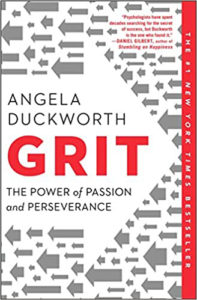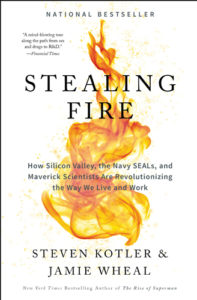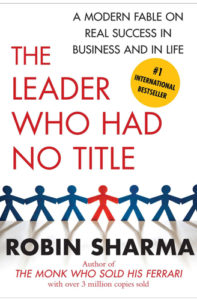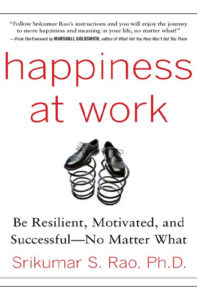Coronavirus. N95s. Incubation period. Self-quarantine. Social distance. Flatten the curve. Lockdown. This is the terminology of a new and disturbing lifestyle.
However, a dramatic break from routine allows you to rethink your life and the changing worlds – social, political, economic, and natural – in which you live.
With the help of books that can help find inspiration, people can work individually and collectively (albeit remotely and separately) to get through this crisis together.
1. Angela Duckworth’s Grit. The Power of Passion and Perseverance
In the face of a dramatically changing world, we will all have to show resilience. It will be essential to know how to recover when this crisis is over. Working hard and sticking to your goals with passion helps, says Duckworth. “Grit means a passion for reaching a certain highest level and persistence to follow.”
Moreover, Duckworth, whose father had told her repeatedly during her childhood that she was “not a genius,” describes how anyone can develop the enthusiasm needed to achieve great things. You don’t need to be exceptionally talented; just be ambitious. It advises you to research what inspires you, then set goals that will stretch you and take you to your comfort zone’s edge. “Keeping our focus on talent distracts us from something that is at least as important, which is effort.”
The most important lesson is that you don’t need to have a great in-born talent for achieving great things.
2. Steve Peters The Chimp Paradox
It sounds artificial to say that we all have a bit of a monkey brain, but the physical fact is that different parts of the brain work differently. Psychiatrist Steve Peters called them humans, chimpanzees, and computers, rather than using scientific names to make this book easier to understand.
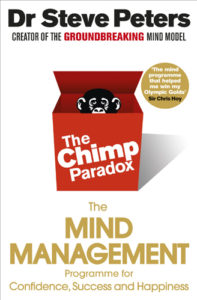 Anyone who has ever sabotaged their success will be relieved to hear that this could be due to the chimpanzee taking control. How do you stop the emotions that are ruining your career? Peters, who has worked with the British Olympic teams, says everything has to do with taming the chimpanzee mind. Your “chimpanzee” brain only thinks about survival, but the human brain wants to live with purpose.
Anyone who has ever sabotaged their success will be relieved to hear that this could be due to the chimpanzee taking control. How do you stop the emotions that are ruining your career? Peters, who has worked with the British Olympic teams, says everything has to do with taming the chimpanzee mind. Your “chimpanzee” brain only thinks about survival, but the human brain wants to live with purpose.
“You or the chimpanzee will make decisions in life. If both agree, there will be peace. When there’s disagreement with a chimpanzee, he usually attacks you, and the attacks can be very emotionally painful. Managing this fight is critical to happiness and success. “
Each chapter explains different aspects of your functioning. Also, there are exercises to do. By doing them, you will notice an immediate improvement in your daily life. With time, you will develop emotional skills and practical habits to help you become the person you want to be and live the way you want.
The most important lesson is that you can learn to tame it once you understand why your mind bounces like a chimpanzee.
3. Amy Cuddy’s Presence: Bringing Your Boldest Self to Your Biggest Challenges
How to imagine trust in times of uncertainty? How do you exude the sense of calm that is often referred to as presence? According to Cuddy, the answer is to be yourself. Sounds good, but a Harvard Business School professor doesn’t mean slouching down and doing whatever you want. It’s about being true to your unique character. “Presence is … a state of being in tune and comfortably expressing our true thoughts, feelings, values, and potential.”
Whether you’re running a team from your laptop in the kitchen or facing a job search after the lockdown, this book will help you develop your self-esteem.
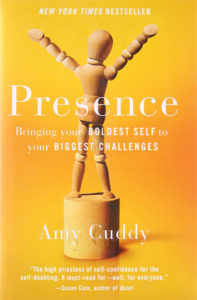 So how did you get there? “Presence occurs when we feel personally powerful, allowing us to be sharply tuned to our most sincere selves. In this mental state, we can remain present even in very stressful situations that make us feel distracted and powerless. ‘
So how did you get there? “Presence occurs when we feel personally powerful, allowing us to be sharply tuned to our most sincere selves. In this mental state, we can remain present even in very stressful situations that make us feel distracted and powerless. ‘
The change can be gradual, and Cuddy asks a few questions to start the process. Ask yourself: what are the three words that best describe you as a person? What is unique about you that helps reach your happiest times and best results? What are your strengths and how to use them?
Finding your answers and then comparing them with physical tips and tricks will give you the skills to cope with meetings, presentations, and interviews with ease.
The most important lesson is that you can learn to reach out to your innermost self and use it to radiate real confidence.
4. Steven Kotler and Jamie Wheal’s Stealing Fire
It is imperative to block the noise of news updates and social media alerts if we are to do any work or research in these difficult times. Being able to focus profoundly is a considerable benefit. However, according to Kotler and Wheal, there is an even further step that can help us be faster and more creative than we ever imagined. It involves getting into the “flow” state, which is how you feel doing something that you love, such as singing, surfing, or painting. It is like moving your consciousness to a higher level.
“A conscious mind is a powerful tool, but it is slow and can only manage a small amount of information at a time. Meanwhile, the subconscious is much more efficient. It can process more data in a much shorter time frame.” According to the authors, exploiting this altered state is the key to tremendous achievements. In a 10-year study by McKinsey, top management said they were five times more efficient, explains Kotler.
The most important lesson is that anyone can learn to use the flow state to be more creative and productive beyond imagination.
5. Robin Sharma’s The Leader Who Had No Title
Since the pandemic creates promotion opportunities for so many employees, it is tempting to forget about leadership skills. According to Sharma, that would be a mistake. Act like a true leader now, regardless of your role, and the rewards will come – eventually. Leadership isn’t just for leaders is a lesson behind the modern-day fairy tale that tells the story of a Milwaukee salesman, Blake Davis, and his quirky mentor. “Imagine reaching world-class levels in your career but achieving the absolute best results in terms of health, relationships, and happiness. I can show you exactly how to achieve it all. And it’s much easier than you might think.”
Easy, but not entirely straightforward. The answer is to reject mediocrity, pursue mastery, and nurture relationships. “We must all lead where planted and shine where we are now.”
This crisis doesn’t have to hold you back. You can learn to recognize and then seize opportunities in times of profound transition. Regardless of position, you can work with people and influence people as if you were a superstar – thus preparing you for success. “Each of us has unrecognized powers and has renounced a potential that far exceeds the power given to the title. When you learn how to wake up and then apply these powers, every element of your life will explode with success. Leadership then becomes automatic – the default where you work and play.”
The most important lesson is that even the smallest employee can demonstrate leadership in approaching work and colleagues.
6. Srikumar Rao’s Happiness at Work
Rao is not a big fan of thinking positively or affirmation (so don’t call it a self-help book). He warns that our tendency to label everything that happens to us as good or bad is not helpful. “When we say something is wrong, the likelihood of us experiencing it increases dramatically,” he explains. “A man will notice that by changing his thoughts about things and other people, things and other people will also change towards him.”
We get carried away when we perform well at work and too depressed when things go wrong. This is not helpful and may make decisions difficult. Taking responsibility is useful, but you need to be aware that you can’t control everything. You will be more happy and effective if you realize that all changes are temporary. “The most important thing to do is recognize that we don’t live in the real world. We live in a construct, and we’ve succeeded.”
We live by what he calls “mental models,” which are our prejudices about how the world works. We have models of how best to find a job, get ahead of it, find a partner, and even choose a car. But these are just constructions created, for example, by our own experience, influences, or upbringing. We have to see what they are, and then we can change our reality. “You forget that everyone you meet, everyone in the world, are people who are stuck in the same situation, trying with their imperfect intellect to make sense of this extremely complex firmament.”
The most important lesson here is that change is the only constant, and all we can control is our response to it.

